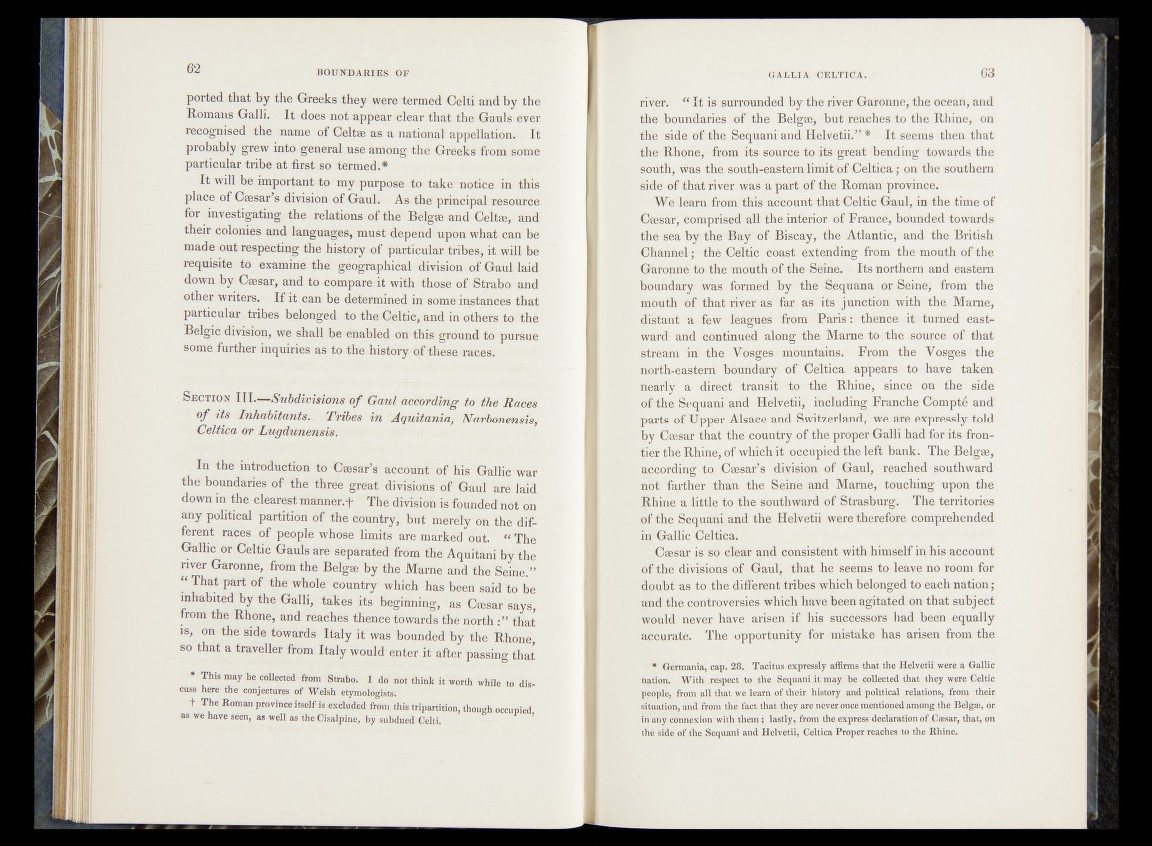
ported that by the Greeks they were termed €elti and by the
Romans Galli. It does not -appear clear that the Gauls ever
recognised the name of Celtse as a national appellation. It
probably grew into general use among the Greeks from some
particular tribe at first so termed.*
It will be important to my purpose to take notice in this
place of Caesar’s division of Gaul. As the principal resource
for investigating the relations of the Belgeeand Celt®, and
their colonies and languages, must depend upon what can be
made out respecting the history of particular tribes, it will be
requisite to examine the geographical division bfeGaul laid
down by Ca&sar, and to compare it with those ©frStrabo and
other writers. If it can be determined in some: instances that
particular tribes belonged to the Celtic, and in others to the
Belgic division, we shall be enabled on this ground to pursue
some further inquiries as to the history of these races.
Section III.—Subdivisions o f Gaul according to the Recces
o f its Inhabitants. Tribes in J quitania, Narbonénsis,
Celtica or Lugdunensis.
In the introduction to Caesar’s account 'öf his Gallic vrar
the boundaries of' the three great divisions of Gaul are laid
down in the clearest manner.f The division is foundedn^i on
any political partition of the country, but merky on.the ^if-
ferent races of people whose limits are marked Oift. “ The
Gallic or Celtic Gauls are separated from the Aquitahiby the
river Garonne, from the Belgae by the Mame and the Séinè?’
“ That part of the whole country which has been said to be
inhabited by the Galli, takes its beginning,- as Caesar say^,
from the Rhone, and reaches thence towards the north that
is, on the side towards Italy it was bounded by the Rhone,
so that a traveller from Italy wouldumter it after passing that
* This may be collected from Strabo. I do Hot think it worth while to discuss
hare the conjectures of Welsh etymologists.
f The Roman province itself is excluded from this tripartition, though occupied
as we. have seen, as well as the (lisalpine, by subdued Gelti.
river. “ It is surrounded by the river Garonne, the ocean, and
the boundaries of the Belgae:, but reaches to the Rhine, on
the side of the Sequani and Helvetii.” * It seems then that
the Rhone, from its source to its great bending towards the
south, was the south-eastern limiti'of «Celtica ; on the southern
side of that river was a parti of the Roman province.
We learn from this account that Celtic Gaul, in the time of
Caesar, comprised all the interior i>£ France; bounded towards
the sea by the Bay* of Biscay, the Atlantic, and the British
Channel ; the Celtic coast extending from the mouth of the
Qaronne to the mouth of the 'Seine; Its northern and eastern
boundary was formed by the Sequana or<*Seine, from the
Mouth of that river as as in ju n ctio n with the Mame,
distant a few lèaguês "from Paris : thence it turned eastward
and continued along the Mame to the source of that
Stream in th é iWpfeges ^mountains'. From the Vosges the
jièrth-eastern boundary of Cptiné? appears to have taken
néarlÿ a^&iffeet_ transit to the Rhine; dsifidê* on the side
of'therScquani and Helvetüpihcluding Franche Compté and*
p trts of Upper AlsCeb-amd Switzerland," we are-expressly told
fey Ca&iar that-'the country of the proper Galli had for its frontier
the Rhine, of which iti occupied the left bank. The Belgae,
Recording to) Cæsar’s division of Gaul, reached southward
not farther than-the Seine and Marne, touching upon the
Rhine a little/to the southward of Strasburg. The territories
of the Sequani and the Helvetii were therefore comprehended
in Gallic Celtica.
' ; ; Caesar is so clear and consistént with himself in his account
of the divisions of. Gaul, that he seems to leave no ,rqhpn for
doubt as to ,the' different tribes which belonged to each nation ;
and the controversies which have been agitated on that subject
would never have arisen* if his successors had bèen equally
accurate. The opportunity, fdri. mistake has arisen from the
* Germania, cap. 28. Tacitus expressly affirms that the Helvetii were a Gallic
nation. With respect to . the Sequani it may .he collected that they were Celtic
people, from all that we learn ofUfern history, and political relations, from their
situation, and from the fact that they are never once mentioned amongthe Belgae, or
in ariy connexion with them ; lastly, from the express declaration of Caesar, that, on
the side of the Sequani and Helvetii, Celtica Proper reaches to tie Rhine.